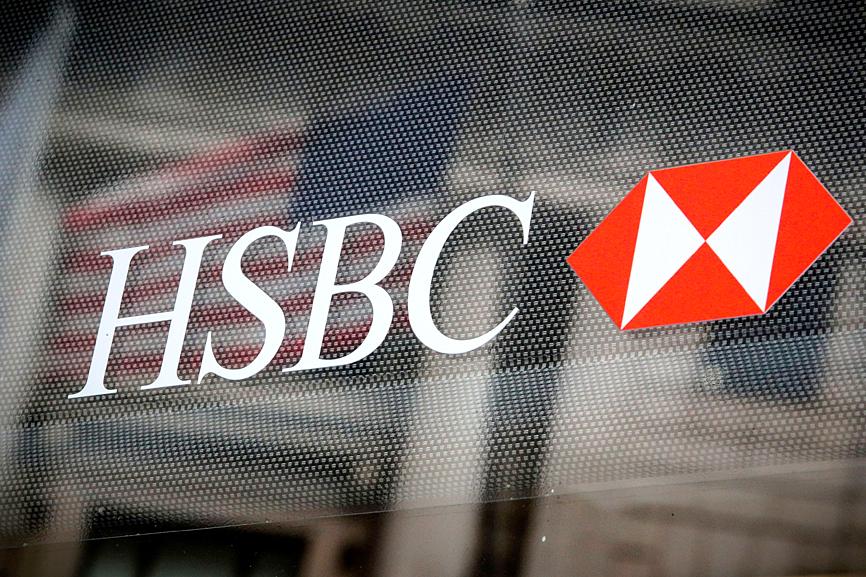HSBC Bank Taiwan Ltd (匯豐台灣商銀) has offered Gogoro Inc (睿能創意) a green loan to purchase energy-efficient products, marking the bank’s first green loan to an electric scooter manufacturer.
Although many people think green loans are exclusive to renewable energy developers, they actually have a broader application, and are extended to any business that can improve the environment, HSBC Taiwan commercial banking head Stanley Hsiao (蕭仲程) told the Taipei Times on Aug. 13.
“Whether a business can reduce carbon emissions or lower its fuel consumption are not the only criteria we use to determine whether to approve a green loan. We also take into account its deployment of energy-efficient technology as important and helpful to the environment,” Hsiao said.

Photo: Reuters
The latter makes a case for Gogoro, which does not directly use green energy to power its battery-swapping stations, but utilizes many energy-efficient components for its electric scooters, including a core component battery, he said.
To avoid having the funds used for just any environmentally friendly expenditure, the bank has required Gogoro to use the funds only for battery purchases and to routinely track the fund flow to check “if the money is being spent in the right place,” he added.
Hsiao did not disclose the size of the loan extended to the electric scooter maker due to a confidentiality agreement, saying only that the figure would be in the middle level of all green loans or sustainability-linked loans HSBC Bank Taiwan has offered.
The bank has also provided green loans or regular corporate loans to local suppliers of electric vehicle maker Tesla Inc, but the loan to Gogoro is the first to an electric scooter maker, he said.
Hsiao said he holds a conservative outlook for the growth of green loans, because compared with sustainability-linked loans, green loans have stricter rules for banks and their corporate clients.
Sustainability-linked loans allow loan-takers to use the funds for general corporate purposes, not just green projects, he said.
Given the stricter criteria for green loans, banks need to carefully communicate to clients what kinds of projects they can spend the money on and to keep on following their progress, he said.
That partly explains why sustainability-linked loans have grown faster than green loans in Taiwan, he said.

CHIP RACE: Three years of overbroad export controls drove foreign competitors to pursue their own AI chips, and ‘cost US taxpayers billions of dollars,’ Nvidia said China has figured out the US strategy for allowing it to buy Nvidia Corp’s H200s and is rejecting the artificial intelligence (AI) chip in favor of domestically developed semiconductors, White House AI adviser David Sacks said, citing news reports. US President Donald Trump on Monday said that he would allow shipments of Nvidia’s H200 chips to China, part of an administration effort backed by Sacks to challenge Chinese tech champions such as Huawei Technologies Co (華為) by bringing US competition to their home market. On Friday, Sacks signaled that he was uncertain about whether that approach would work. “They’re rejecting our chips,” Sacks

NATIONAL SECURITY: Intel’s testing of ACM tools despite US government control ‘highlights egregious gaps in US technology protection policies,’ a former official said Chipmaker Intel Corp has tested chipmaking tools this year from a toolmaker with deep roots in China and two overseas units that were targeted by US sanctions, according to two sources with direct knowledge of the matter. Intel, which fended off calls for its CEO’s resignation from US President Donald Trump in August over his alleged ties to China, got the tools from ACM Research Inc, a Fremont, California-based producer of chipmaking equipment. Two of ACM’s units, based in Shanghai and South Korea, were among a number of firms barred last year from receiving US technology over claims they have

It is challenging to build infrastructure in much of Europe. Constrained budgets and polarized politics tend to undermine long-term projects, forcing officials to react to emergencies rather than plan for the future. Not in Austria. Today, the country is to officially open its Koralmbahn tunnel, the 5.9 billion euro (US$6.9 billion) centerpiece of a groundbreaking new railway that will eventually run from Poland’s Baltic coast to the Adriatic Sea, transforming travel within Austria and positioning the Alpine nation at the forefront of logistics in Europe. “It is Austria’s biggest socio-economic experiment in over a century,” said Eric Kirschner, an economist at Graz-based Joanneum

BUBBLE? Only a handful of companies are seeing rapid revenue growth and higher valuations, and it is not enough to call the AI trend a transformation, an analyst said Artificial intelligence (AI) is entering a more challenging phase next year as companies move beyond experimentation and begin demanding clear financial returns from a technology that has delivered big gains to only a small group of early adopters, PricewaterhouseCoopers (PwC) Taiwan said yesterday. Most organizations have been able to justify AI investments through cost recovery or modest efficiency gains, but few have achieved meaningful revenue growth or long-term competitive advantage, the consultancy said in its 2026 AI Business Predictions report. This growing performance gap is forcing executives to reconsider how AI is deployed across their organizations, it said. “Many companies